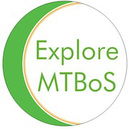No Hands Up, Except to Ask a Question AND Rough Draft Thinking
Every teacher intimately knows the problem of only 4 or 5 kids raising their hands to answer questions. This is meant to address that problem. I want to know what every student is thinking not just 4 or 5 of them. Rather than asking the entire class a question and then calling on students that raise their hands, I've moved to calling on students based on a set of cards for the class. Before every class I shuffle the cards. When I ask a question, students put their hands up but I remind them that I'm only calling on students with the cards.
By no means is this a new idea in education. I tried it in my first couple years of teaching and it went very poorly. Students felt uncomfortable with me putting them on the spot let alone without knowing how to do the problem. Add on top of that my inexperience as a young teacher who still struggled with classroom management, along with my inability to foster a productive classroom conversation, and you had a recipe for disaster. This time things went incredibly well!
What went differently? Rough draft thinking. Last year, as a school, we worked on writing across subjects. When I sat down with the English and History teachers and heard them talk about the significant revision process in their classrooms I was struck by how different the math classroom tends to be. We want our math students to try new ideas and embrace failure as part of the learning process but we only take their first answer as either right or wrong. Based on that conversation I attempted to shift classroom culture to embrace the revision process by talking about rough draft thinking. When I ask students to do something, I don’t expect them to do it correctly the first time. Nowhere else in life do we expect that. We expect that our initial attempt will be riddled with problems but at least it’s a starting place. It’s now part of the mantra in our classroom.
I expect students to be kind and to be brave. Because I’m going to call on students using the cards, I need them to be brave. I’m expecting them to present their rough draft thinking. It’s nerve racking to present information when you feel very unsure of yourself and you know it’s probably incorrect. That’s okay. That’s the expectation. I expect you to present something that will be a starting point for our classroom conversation not the ending of it. For the rest of the class, I need you to be kind. There can be no laughing, or snickering, or giggling. At all. It doesn’t really matter whether it’s directed at the presenter or not. The presenter will feel like it is. We will honor each other’s ideas and critique them with care. If you're the one who yells out “That’s stupid!” I will ask you to leave without any questions asked. Can we agree on this together? Everyone nods their heads.
This has gone incredibly well! The level of discourse in my classroom has been phenomenal. In late August, I had students taking chances and buying into my narrative of what a math classroom could look like that normally doesn’t happen until sometime in November. There has been zero push back on me calling on students who don’t know the answers. None. I can’t believe it. When a student doesn’t know what’s going on, I ask them to give a starting point for the conversation. How might they approach the problem? What information do they see that might be relevant? IDK isn’t an option if you’re called on. You have to help the class move forward somehow.
I don't know who I borrowed the rough draft thinking idea from, but if it's you, thank you! I do know that Amanda Jansen (@MandyMathEd) is doing some great work in this area.
 RSS Feed
RSS Feed



